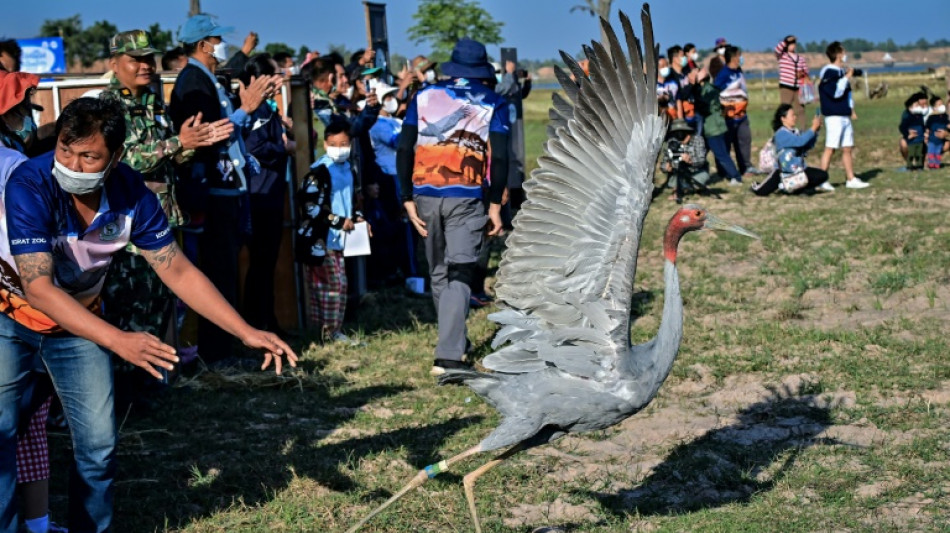
-
 Unbeaten Miami edge Columbus in front of big crowd in Cleveland
Unbeaten Miami edge Columbus in front of big crowd in Cleveland
-
Kim takes one-shot lead over Thomas, Novak at RBC Heritage

-
 Another round of anti-Trump protests hits US cities
Another round of anti-Trump protests hits US cities
-
'So grateful' - Dodgers star Ohtani and wife welcome first child

-
 PSG maintain unbeaten Ligue 1 record, Marseille back up to second
PSG maintain unbeaten Ligue 1 record, Marseille back up to second
-
US, Iran report progress in nuclear talks, will meet again

-
 US Supreme Court intervenes to block Trump deportations
US Supreme Court intervenes to block Trump deportations
-
Hamas armed wing says fate of US-Israeli captive unknown

-
 Pacers thump Bucks to open NBA playoffs
Pacers thump Bucks to open NBA playoffs
-
Sabalenka reaches Stuttgart semis as Ostapenko extends Swiatek mastery

-
 Zelensky says Ukraine will observe Putin's Easter truce but claims violations
Zelensky says Ukraine will observe Putin's Easter truce but claims violations
-
'Fuming' Watkins fires Villa in bid to prove Emery wrong

-
 DR Congo boat fire toll revised down to 33
DR Congo boat fire toll revised down to 33
-
England thrash Scotland to set up France Grand Slam showdown

-
 Verstappen's Red Bull 'comes alive' to claim record pole in Jeddah
Verstappen's Red Bull 'comes alive' to claim record pole in Jeddah
-
McTominay fires Napoli level with Inter as Conte fuels exit rumours

-
 Rajasthan unleash Suryavanshi, 14, as youngest IPL player but lose thriller
Rajasthan unleash Suryavanshi, 14, as youngest IPL player but lose thriller
-
Man City boost top five bid, Aston Villa thrash in-form Newcastle

-
 Villa rout Newcastle to rekindle bid to reach Champions League
Villa rout Newcastle to rekindle bid to reach Champions League
-
Dumornay gives Lyon lead over Arsenal in Women's Champions League semis

-
 Trans rights supporters rally in London, Edinburgh after landmark ruling
Trans rights supporters rally in London, Edinburgh after landmark ruling
-
'We have to wait': Barca's Flick on Lewandowski injury fear

-
 Bordeaux-Begles backups edge Pau to close in on Top 14 summit
Bordeaux-Begles backups edge Pau to close in on Top 14 summit
-
Trans rights supporters rally outside in London, Edinburgh after landmark ruling

-
 PSG beat Le Havre to stay on course for unbeaten Ligue 1 season
PSG beat Le Havre to stay on course for unbeaten Ligue 1 season
-
Man City close in on Champions League with Everton late show

-
 14-year-old Vaibhav Suryavanshi becomes youngest IPL player
14-year-old Vaibhav Suryavanshi becomes youngest IPL player
-
Barca make stunning comeback to beat Celta Vigo in Liga thriller

-
 Zverev sets up birthday bash with Shelton in Munich
Zverev sets up birthday bash with Shelton in Munich
-
Man City boost top five bid, Southampton snatch late leveller

-
 US Supreme Court intervenes to pause Trump deportations
US Supreme Court intervenes to pause Trump deportations
-
Alcaraz and Rune race into Barcelona final

-
 US, Iran to hold more nuclear talks after latest round
US, Iran to hold more nuclear talks after latest round
-
Man City close in on Champions League thanks to Everton late show

-
 Bayern close in on Bundesliga title with Heidenheim thumping
Bayern close in on Bundesliga title with Heidenheim thumping
-
Tunisia opposition figures get jail terms in mass trial

-
 Putin announces 'Easter truce' in Ukraine
Putin announces 'Easter truce' in Ukraine
-
McLaren duo in ominous show of force in Saudi final practice

-
 Afghan PM condemns Pakistan's 'unilateral' deportations
Afghan PM condemns Pakistan's 'unilateral' deportations
-
Iran says to hold more nuclear talks with US after latest round

-
 Comeback queen Liu leads US to World Team Trophy win
Comeback queen Liu leads US to World Team Trophy win
-
Buttler fires Gujarat to top of IPL table in intense heat

-
 Unimpressive France stay on course for Grand Slam showdown
Unimpressive France stay on course for Grand Slam showdown
-
Shelton fights past Cerundolo to reach Munich ATP final

-
 Vance and Francis: divergent values but shared ideas
Vance and Francis: divergent values but shared ideas
-
Iran, US conclude second round of high-stakes nuclear talks in Rome

-
 Dumornay gives Lyon first leg lead over Arsenal in women's Champions League semis
Dumornay gives Lyon first leg lead over Arsenal in women's Champions League semis
-
Trans rights supporters rally outside UK parliament after landmark ruling

-
 Rune destroys Khachanov to reach Barcelona Open final
Rune destroys Khachanov to reach Barcelona Open final
-
From Messi to Trump, AI action figures are the rage


Fly away home: rare Eastern Sarus cranes released in Thailand
As the sun came up, 13 Thai Eastern Sarus cranes were released over a rippling reservoir in northeast Thailand, the latest effort to revive the almost-extinct species in the kingdom.
More commonly known as Thai cranes, the birds nearly disappeared from the country roughly 50 years ago -- they were last spotted in the wild in 1968 -- before a collaboration between the Thai government, Nakhon Ratchasima Zoo and United Nations to save them.
A breeding programme, using fowl donated by Cambodia, began in 1989, with the first reintroduction in 2011.
Sarus cranes are classed by the ICNC as "vulnerable", with an estimated 15,000 remaining in the wild -- with the Thai sub-species having been thought to have disappeared from Thailand's wild wetlands.
But since 2011, more than 150 captively-bred birds -- which can grow to up to six feet (1.8 metres) and weigh almost seven kilograms (15 pounds) -- have been released in Buriram province.
"It is the only place where the Thai cranes are able to live and reproduce on their own," said Governor Chaiwat Chuntirapong.
The birds were transported in large, specially adapted boxes -- their red-feathered heads watching through mesh windows -- from the Wetland and Eastern Sarus Crane Conservation Center where they were bred to the Huai Chorakhe Mak Reservoir.
The latest flock of 13 cranes were released all at once on Christmas Day. The tall birds loudly honked and clumsily flapped as they unsteadily took to the skies accompanied by cheering children and spectators.
It was the final moment in a long journey for the researchers, who carefully nurtured the cranes from hatching, gradually introduced them to the wild and then took them to their final flight to freedom.
"The herdsman wears a suit that hides her body and wears a bird's head puppet on her hands to teach the birds everything from feeding to familiarising them with nature," said Nakhon Ratchasima Zoo researcher Tanat Uttaraviset.
As a result of the long process, roughly 60 to 70 percent of the birds survive in the wild, he said.
Prior to their release, each bird is micro-chipped and tagged, allowing researchers to track them and improve the conservation efforts.
As well as rearing and releasing the cranes, an important part of the programme has been educating people about the species and the environment.
Huai Chorakhe Mak Reservoir was chosen partly thanks to its natural proliferation of water chestnuts -- an important food source for cranes in the dry season.
But their habitat remains threatened by the "widespread invasion of agriculture", said director of Nakhon Ratchasima Zoo Thanachon Kensing.
The zoo has established a learning centre, teaching tourists and locals about how to better care for the environment the birds need to survive.
"Changing villagers' attitudes is difficult," Thanachon admitted.
"But if we can communicate with them... this project will be successful," he said.
Watching his red-headed charges soar off over the sparkling waters, researcher Tanat had just one hope.
"The ultimate goal is to secure the crane population," he said.
T.Ward--AMWN



